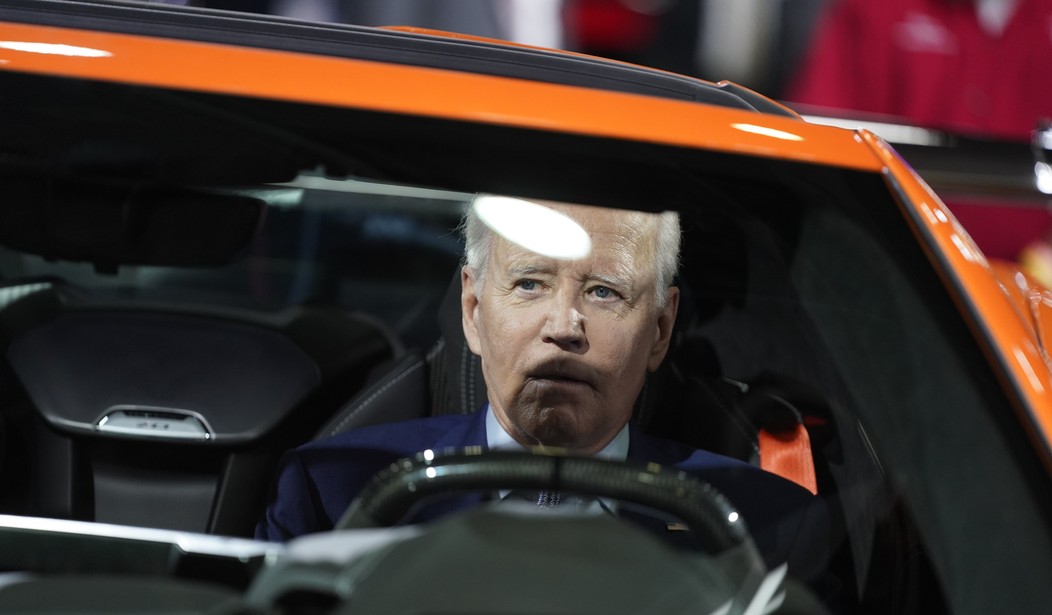The Biden administration is proposing two sets of new rules to limit vehicle emissions in a move critics say proves electric vehicles would fail in a free market.
The proposed Environmental Protection Agency regulation would set limits on emissions for all types of vehicles and fundamentally transform the auto industry, as manufacturers who do not get in line would face regulatory penalties.
Under the proposal, at least 54 percent of new vehicles sold would need to be electric by 2030, while up to 67 percent may need to be electric by 2032. This is more strict than the 50-percent EV figure the auto industry agreed to in 2021.
Today, we are proposing the strongest-ever pollution standards for cars and trucks. These proposed standards will accelerate the transition to a clean transportation future and help tackle the climate crisis. pic.twitter.com/FWaSTaRrRV
— U.S. EPA (@EPA) April 12, 2023
Biden also wants automakers to raise gas mileage and cut tailpipe pollution between now and model year 2026. That would mark a significant step toward meeting his pledge to cut America’s planet-warming greenhouse gas emissions in half by 2030 as he pushes a once-almost-unthinkable shift from gasoline-powered engines to battery-powered vehicles.
With electric vehicles accounting for just 7.2% of U.S. vehicle sales in the first quarter of this year, the industry has a long way to go to even approach the administration’s targets. However, the percentage of EV sales is growing. Last year it was 5.8% of new vehicles sales.
The EPA declined to offer details ahead of Wednesday’s announcement, but said in a statement that as directed by Biden’s order, it is “developing new standards that will ... accelerate the transition to a zero-emissions transportation future, protecting people and the planet.″
The EPA tailpipe pollution limits don’t actually require a specific number of electric vehicles to be sold every year, but instead mandate limits on greenhouse gas emissions. That amounts to roughly the same thing, according to agency calculations of the number of EVs that likely would be needed to comply with the stricter pollution limits. (AP)
Recommended
Energy industry group Power the Future blasted the proposal.
“Biden’s newest power grab is the latest attempt to force a green agenda on an unwilling electorate in order to reward his eco-extremist supporters,” said Daniel Turner, Founder and Executive Director of Power The Future. “Despite massive tax breaks and flattering coverage in the media, EVs simply cannot compete in the free market. If Joe Biden is going to force Americans to give up their preferred mode of transportation, Congress should mandate the White House and every member of the Biden Administration drive EVs exclusively and immediately.”
March: Automakers lose big on electric vehicles
— Philip Melanchthon Wegmann (@PhilipWegmann) April 8, 2023
Ford, for instance, lost $2 billion on EVs in 2022 and is expected to lose another $3B this year
April: EPA prepares new regulations to force the sale of EVs with goal of 67% of new passenger vehicles going electric by 2032. pic.twitter.com/UZmFU0tdwV
The new standards are the latest effort to outright ban combustion engines in America.
⚠️ "This isn't a conspiracy theory. This is a move to try to prohibit and ban gas-powered cars in America. These new standards that the EPA is trying to establish would make it almost impossible to produce gas-powered cars." @StephenMoore #ampFW pic.twitter.com/bITCgp3pbU
— FreedomWorks (@FreedomWorks) April 11, 2023
And as some point out, the move makes America further dependent on China.
Fuel economy standards were implemented in 1975 in response to the Arab oil embargo.
— US Oil & Gas Association (@US_OGA) April 12, 2023
Since most batteries/materials/rare earths supply chains are controlled by China;
EPA is mandating that US energy security be completely reliant on China by no later than 2035.
Go figure. pic.twitter.com/GHM8PB6CTu
Answering questions about the proposal, White House Press Secretary Karine Jean-Pierre said "ambitious action" is required to address the "climate crisis."
Karine Jean-Pierre is asked about forthcoming EPA "tailpipe emission rules" and their impact on prices.
— RNC Research (@RNCResearch) April 10, 2023
She says "when it comes to climate crisis, it requires ambitious action." pic.twitter.com/TDzyD1AJxO

























Join the conversation as a VIP Member